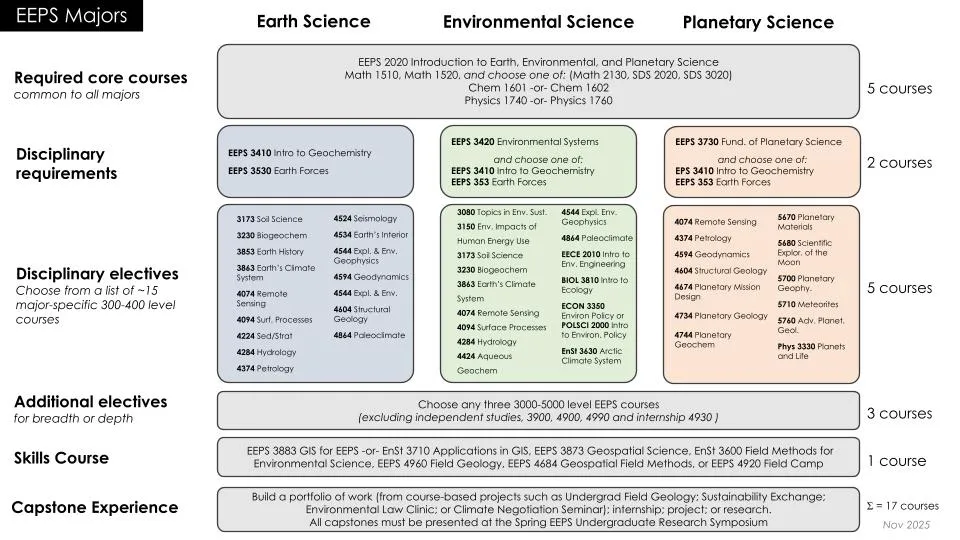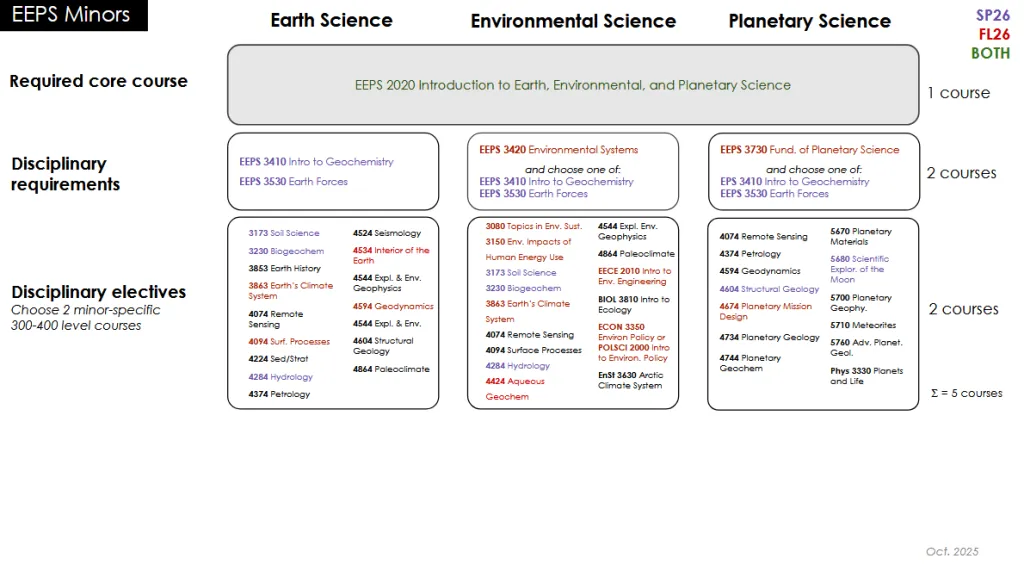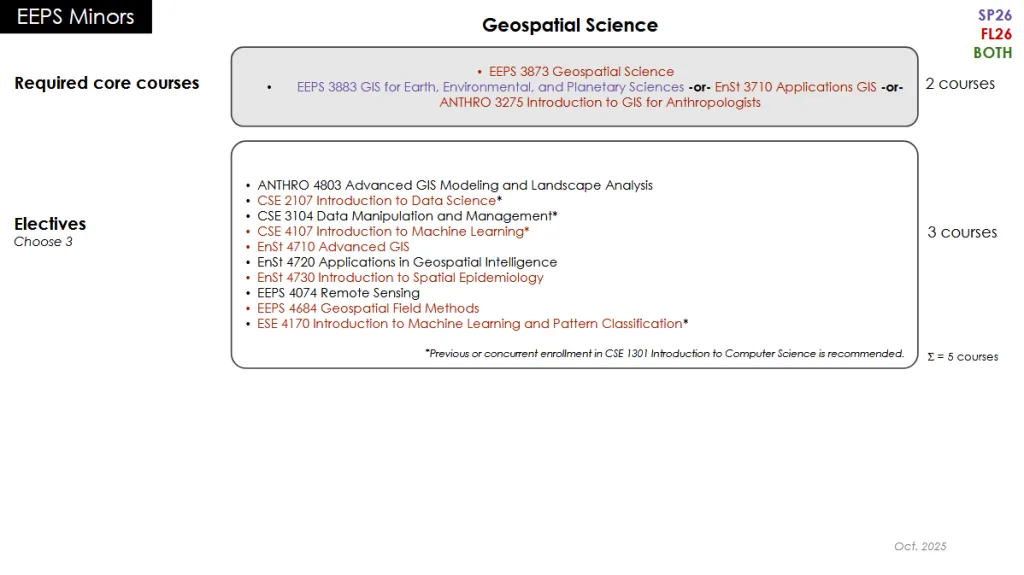


The curriculum posted on the EEPS department website is the most accurate and up-to-date version of the program requirements. Any discrepancies between the EEPS website and the Bulletin or Workday are the result of administrative lag and will be corrected in due course. If your degree progress on Workday is affected by this, an academic requirement override must be requested by emailing Erin Marshall (marshall.e@wustl.edu).
Earth Science Major
Earth Science is the application of natural science and mathematics to the study of the planet Earth, its formation, structure, evolution, and geologic hazards.
EEPS 2020 Introduction to Earth, Environmental, and Planetary Science.
Math 1520 and choose one of: (Math 2130, SDS 2020, SDS 3020)
Chem 1601 -OR- Chem 1701
Physics 1740 -OR- Physics 1760
Disciplinary Requirements: ( 2 Courses )
- EEPS 3410 Intro to Geochemistry
- EEPS 3530 Earth Forces
Disciplinary Electives: ( 5 Courses)
- EEPS 3173 Soil Science
- EEPS 3230 Biogeochemistry
- EEPS 3853 Earth History
- EEPS 3863 The Earth's Climate System
- EEPS 4034 Glaciology
- EEPS 4074 Remote Sensing
- EEPS 4094 Surface Processes
- EEPS 4224 Sedimentary Geology
- EEPS 4284 Hydrology
- EEPS 4374 Igneous and Metamorphic Petrology
- EEPS 4414 Introduction to Geochemistry
- EEPS 4524 Introduction to Seismology
- EEPS 4534 Interior of the Earth
- EEPS 4544 Exploration and Environmental Geophysics
- EEPS 4594 Geodynamics
- EEPS 4604 Introduction to Structural Geology
- EEPS 4864 Paleoclimatology
Additional Electives ( for breadth or depth) - Choose any three 3000 - 5000 level EEPS courses (excluding EEPS 3900, 4900, 4990 and internship 4930) = 3 Courses
Skill Course: EEPS 3883 GIS for Earth, Environmental, and Planetary Sciences - OR- EnSt 3710 Applications in GIS Geospatial Science, EnST 3600 Field Methods in Environmental Science, EEPS 4960 Field Geology, EEPS 4684 Geospatial Fields Methods, or EEPS 4924 Field Camp = 1 Course
Capstone Experience: Build a portfolio of work from course based projects (such as Field Geology, Sustainability Exchange, Environmental Law Clinic, or Climate Negotiation Seminar), internship experience, or research. All capstones must be presented at the Spring EEPS Undergraduate Research Symposium = 17 Courses
Environmental Science Major
Environmental Science is the scientific investigation of natural systems including the hydrosphere, cryosphere, atmosphere, ecosystems, and landscapes which sit at the intersection of the Earth and humanity.
EEPS 2020 Introduction to Earth, Environmental, and Planetary Science.
Math 1520 and choose one of: (Math 2130, SDS 2020, SDS 3020)
Chem 1601 -OR- Chem 1701
Physics 1740 -OR- Physics 1760
Disciplinary Requirements: ( 2 Courses )
- EEPS 3420 Environmental Systems (and choose one of):
- EEPS 3410 Intro to Geochemistry
- EEPS 3530 Earth Forces
Disciplinary Electives: ( 5 Courses)
- EEPS 3080 Topics in Environmental Sustainability
- EEPS 3150 Environmental Impacts of Human Energy Use
- EEPS 3173 Soil Science
- EEPS 3230 Biogeochemistry
- EEPS 3863 The Earth's Climate System
- EEPS 4034 Glaciology
- EEPS 4074 Remote Sensing
- EEPS 4094 Surface Processes
- EEPS 4284 Hydrology
- EEPS 4424 Aqueous Geochemistry
- EEPS 4544 Exploration and Environmental Geophysics
- EEPS 4864 Paleoclimatology
- EECE 2010 Introduction to Energy, Environmental, and Chemical Engineering
- Econ 3350 Environmental Policy or PoliSci 2010 Introduction to Environmental Policy
- EnSt 3630 Arctic Climate System
- Bio 3810 Introduction to Ecology
Additional Electives ( for breadth or depth) - Choose any three 3000 - 5000 level EEPS courses (excluding EEPS 3900, 4900, 4990 and internship 4930) = 3 Courses
Skill Course: EEPS 3883 GIS for Earth, Environmental, and Planetary Sciences - OR- EnSt 3710 Applications in GIS Geospatial Science, EnST 3600 Field Methods in Environmental Science, EEPS 4960 Field Geology, EEPS 4684 Geospatial Fields Methods, or EEPS 4924 Field Camp = 1 Course
Capstone Experience: Build a portfolio of work from course based projects (such as Field Geology, Sustainability Exchange, Environmental Law Clinic, or Climate Negotiation Seminar), internship experience, or research. All capstones must be presented at the Spring EEPS Undergraduate Research Symposium = 17 Courses
Planetary Science Major
Planetary Science uses the tools of geoscience and geospatial analysis to study objects in the solar system, including planets, moons, and meteorites.
EEPS 2020 Introduction to Earth, Environmental, and Planetary Science.
Math 1520 and choose one of: (Math 2130, SDS 2020, SDS 3020)
Chem 1601 -OR- Chem 1701
Physics 1740 -OR- Physics 1760
Disciplinary Requirements: ( 2 Courses )
- EEPS 3730 Fundamentals of Planetary Science (and choose one of):
- EEPS 3410 Intro to Geochemistry
- EEPS 353 Earth Forces
Disciplinary Electives: ( 5 Courses)
- EEPS 4074 Remote Sensing
- EEPS 4374 Igneous and Metamorphic Petrology
- EEPS 4594 Geodynamics
- EEPS 4604 Introduction to Structural Geology
- EEPS 4674 Planetary Mission Design
- EEPS 4734 Planetary Geology
- EEPS 4744 Planetary Geochemistry
- EEPS 5670 Planetary Materials
- EEPS 5680 Scientific Exploration of the Moon
- EEPS 5700 Planetary Geophysics and Dynamics
- EEPS 5760 Advanced Planetary Geology: Ice Worlds
- Phys 3330 Planets and Life In the Universe
Additional Electives ( for breadth or depth) - Choose any three 3000 - 5000 level EEPS courses (excluding EEPS 3900, 4900, 4990 and internship 4930) = 3 Courses
Skill Course: EEPS 3883 GIS for Earth, Environmental, and Planetary Sciences - OR- EnSt 3710 Applications in GIS Geospatial Science, EnST 3600 Field Methods in Environmental Science, EEPS 4960 Field Geology, EEPS 4684 Geospatial Fields Methods, or EEPS 4924 Field Camp = 1 Course
Capstone Experience: Build a portfolio of work from course based projects (such as Field Geology, Sustainability Exchange, Environmental Law Clinic, or Climate Negotiation Seminar), internship experience, or research. All capstones must be presented at the Spring EEPS Undergraduate Research Symposium = 17 Courses
Minor in Earth Science
EEPS 2020 Introduction to Earth, Environmental and Planetary Science = 1 course
Disciplinary Requirements: ( 2 Courses )
- EEPS 3410 Intro to Geochemistry
- EEPS 3530 Earth Forces
Disciplinary Electives: ( 2 Courses)
- EEPS 3173 Soil Science
- EEPS 3230 Biogeochemistry
- EEPS 3853 Earth History
- EEPS 3863 The Earth's Climate System
- EEPS 4034 Glaciology
- EEPS 4074 Remote Sensing
- EEPS 4094 Surface Processes
- EEPS 4224 Sedimentary Geology
- EEPS 4284 Hydrology
- EEPS 4374 Igneous and Metamorphic Petrology
- EEPS 4414 Introduction to Geochemistry
- EEPS 4524 Introduction to Seismology
- EEPS 4534 Interior of the Earth
- EEPS 4544 Exploration and Environmental Geophysics
- EEPS 4594 Geodynamics
- EEPS 4604 Introduction to Structural Geology
- EEPS 4864 Paleoclimatology
Minor in Environmental Science
EEPS 2020 Introduction to Earth, Environmental and Planetary Science = 1 course
Disciplinary Requirements: ( 2 Courses )
- EEPS 3420 Environmental Systems (and choose one of the following):
- EEPS 3410 Intro to Geochemistry
- EEPS 3530 Earth Forces
Disciplinary Electives: ( 2 Courses)
- EEPS 3080 Topics in Environmental Sustainability
- EEPS 3150 Environmental Impacts of Human Energy Use
- EEPS 3173 Soil Science
- EEPS 3230 Biogeochemistry
- EEPS 3863 The Earth's Climate System
- EEPS 4034 Glaciology
- EEPS 4074 Remote Sensing
- EEPS 4094 Surface Processes
- EEPS 4284 Hydrology
- EEPS 4424 Aqueous Geochemistry
- EEPS 4544 Exploration and Environmental Geophysics
- EEPS 4864 Paleoclimatology
- EECE 2010 Introduction to Energy, Environmental, and Chemical Engineering
- Econ 3350 Environmental Policy or PoliSci 2010 Introduction to Environmental Policy
- EnSt 3630 Arctic Climate System
- Bio 3810 Introduction to Ecology
Minor in Planetary Science
EEPS 2020 Introduction to Earth, Environmental and Planetary Science = 1 course
Disciplinary Requirements: ( 2 Courses )
- EEPS 3730 Fundamentals of Planetary Science (and choose one of):
- EEPS 3410 Intro to Geochemistry
- EEPS 3530 Earth Forces
Disciplinary Electives: ( 2 Courses)
- EEPS 4074 Remote Sensing
- EEPS 4374 Igneous and Metamorphic Petrology
- EEPS 4594 Geodynamics
- EEPS 4604 Introduction to Structural Geology
- EEPS 4674 Planetary Mission Design
- EEPS 4734 Planetary Geology
- EEPS 4744 Planetary Geochemistry
- EEPS 5670 Planetary Materials
- EEPS 5680 Scientific Exploration of the Moon
- EEPS 5700 Planetary Geophysics and Dynamics
- EEPS 5760 Advanced Planetary Geology: Ice Worlds
- Phys 3330 Planets and Life In the Universe
Minor in Geospatial Science
Disciplinary Requirements: ( 2 Courses )
- EEPS 3873 Geospatial Science
- EEPS 3883 GIS for Earth, Environmental, and Planetary Sciences -OR- Enst 3710 Applications in GIS -OR- ANTHRO 3275 Introduction to GIS for Anthropologists
Disciplinary Electives: (3 Courses)
- Anthro 4803 Advanced GIS Modeling and Landscape Analysis
- CSE 2107 Introduction to Data Science *
- CSE 3104 Data Manipulation and Management *
- CSE 4107 Introduction to Machine Learning *
- EEPS 4074 Remote Sensing
- EEPS 4684 Geospatial Field Methods
- EnSt 4710 Advanced GIS
- EnSt 4720 Applications in Geospatial Intelligence
- EnSt 4730 Introduction to Spatial Epidemiology
- ESE 4170 Introduction to Machine Learning and Pattern Classification *
* Previous or concurrent enrollment in CSE 131 Introduction to Computer Science is recommended.
For more information about majors and minors, please consult the Bulletin or contact Phil Skemer (Professor and Director of Undergraduate Studies).